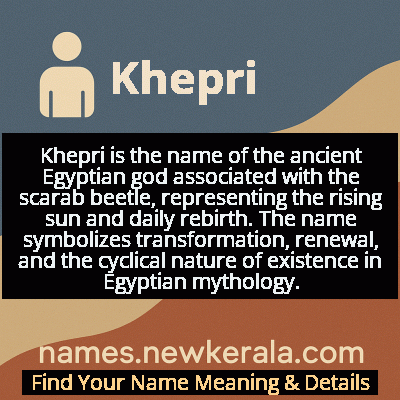Khepri Name Meaning & Details
Origin, Popularity, Numerology Analysis & Name Meaning of Khepri
Discover the origin, meaning, and cultural significance of the name KHEPRI. Delve into its historical roots and explore the lasting impact it has had on communities and traditions.
Name
Khepri
Gender
Male
Origin
Egyptian
Lucky Number
4
Meaning of the Name - Khepri
Khepri is the name of the ancient Egyptian god associated with the scarab beetle, representing the rising sun and daily rebirth. The name symbolizes transformation, renewal, and the cyclical nature of existence in Egyptian mythology.
Khepri - Complete Numerology Analysis
Your Numerology Number
Based on Pythagorean Numerology System
Ruling Planet
Uranus (Rahu)
Positive Nature
Strong sense of order, loyal, practical, and disciplined.
Negative Traits
Stubborn, overly serious, rigid, and prone to feeling restricted.
Lucky Colours
Blue, gray.
Lucky Days
Saturday.
Lucky Stones
Blue sapphire.
Harmony Numbers
1, 7, 8.
Best Suited Professions
Managers, engineers, accountants, organizers.
What People Like About You
Dependability, discipline, practicality.
Famous People Named Khepri
Khepri
Ancient Egyptian deity
God of the morning sun, creation, and rebirth
Khepri (High Priest)
Religious leader
Served as high priest in Heliopolis with significant temple inscriptions
Khepri (Architect)
Royal architect
Designed royal tombs with innovative solar alignment techniques
Name Variations & International Equivalents
Click on blue names to explore their detailed meanings. Gray names with will be available soon.
Cultural & Historical Significance
Throughout Egyptian history, from the Old Kingdom through the Ptolemaic period, Khepri maintained consistent religious importance. Temple reliefs at Karnak, Abydos, and other major religious centers depict Khepri alongside other major deities, often shown pushing the sun disk upward. The famous 'Book of the Dead' contains multiple spells invoking Khepri's transformative power for successful rebirth. Archaeological evidence shows scarab amulets were among the most common funerary items across all social classes, demonstrating Khepri's widespread cultural penetration beyond just royal or priestly circles.
Extended Personality Analysis
Those named Khepri typically exhibit a unique blend of traditional wisdom and innovative thinking, reflecting their namesake's role as both ancient deity and agent of daily renewal. They often demonstrate exceptional resilience, able to emerge strengthened from difficult circumstances much like the scarab beetle transforms waste into life-sustaining material. Their leadership style tends to be inclusive and transformative rather than authoritarian, focusing on empowering others to achieve collective growth. Khepri-named individuals usually possess strong intuitive abilities, particularly regarding timing and natural cycles, making them excellent strategists and planners.
In interpersonal relationships, people with this name often serve as catalysts for positive change in their social circles. They have a natural talent for recognizing potential in others and helping them actualize it. Their morning-oriented energy pattern means they're often most productive and insightful during early hours, and they may struggle with maintaining momentum as the day progresses. Despite their transformative nature, they typically maintain deep respect for established systems and traditions, seeking to work within frameworks while introducing meaningful evolution. Their combination of persistence, creativity, and cyclical thinking makes them particularly effective in fields requiring long-term vision and adaptive strategies.
Modern Usage & Popularity
Khepri remains an exceptionally rare given name in contemporary usage, primarily confined to specific subcultures with strong interests in Egyptology, mythology, or unique spiritual naming practices. In Egypt itself, the name has seen minor revival among intellectuals and families seeking to reconnect with pre-Islamic heritage, though it remains uncommon compared to traditional Arabic names. Internationally, Khepri appears occasionally in academic families, particularly those with backgrounds in archaeology or ancient history. The name has gained some traction in fantasy and gaming communities, where Egyptian mythology enjoys popularity. Despite its rarity, Khepri maintains consistent usage at a very low level, with perhaps a few dozen children receiving the name annually worldwide. Its appeal lies in its profound symbolic meaning rather than trendiness, attracting parents seeking names with deep cultural resonance and unique character.
Symbolic & Spiritual Meanings
Khepri embodies the powerful symbolism of metamorphosis and eternal return, representing the fundamental truth that endings inevitably give way to new beginnings. The scarab beetle's life cycle—from egg to larva to adult—serves as a perfect metaphor for personal and spiritual evolution, suggesting that all beings contain the potential for complete transformation. As a solar symbol, Khepri represents the victory of light over darkness and the assurance that no matter how dark the night, dawn will always follow. This makes the name particularly symbolic of hope, resilience, and the human capacity to rise above circumstances. The ancient Egyptian belief that scarabs spontaneously generated from dung added another layer of meaning—the concept that life can emerge from the most unlikely sources, symbolizing unexpected opportunities and the hidden potential within apparent limitations.

